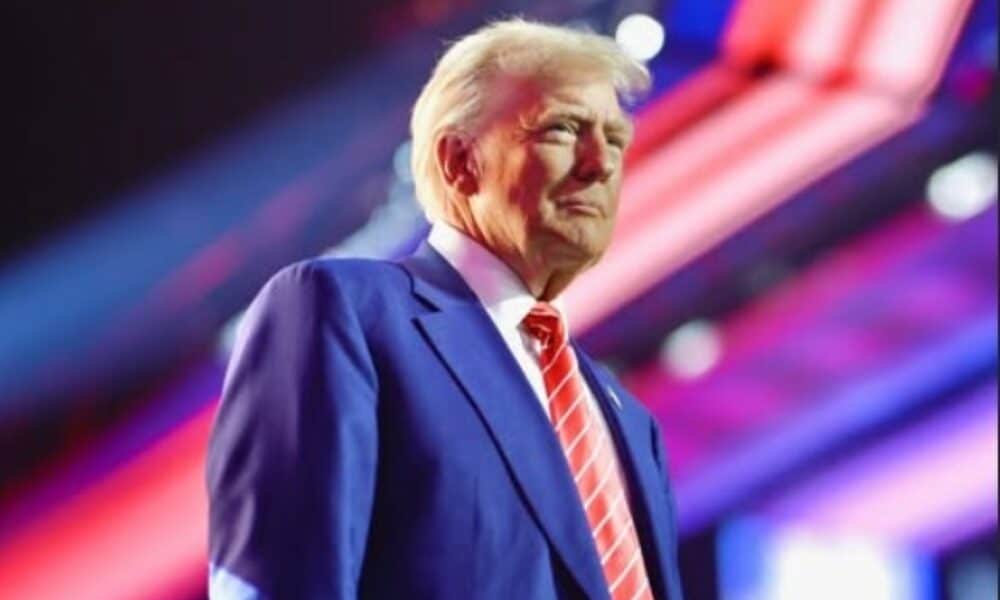Trump imposes 25% tariff on steel and aluminum, impacting Brazilian exports
President Donald Trump announced the imposition of a 25% tariff on all steel and aluminum imports into the United States. The decision, long anticipated by economic sectors, was formalized through an executive order signed on Monday (10). According to the U.S. government, the measure aims to strengthen domestic industry and reduce dependence on foreign products, ensuring greater competitiveness for local producers. The tariff applies to all exporting countries without exceptions, including Brazil, which ranks among the main steel suppliers to the U.S.
The new taxation directly impacts Brazilian steel companies, which have previously faced similar trade barriers during Trump’s first term from 2017 to 2021. During that period, tariffs on steel and aluminum were imposed and later eased through a quota system. Now, with the return of stricter protectionist policies, Brazil faces significant consequences, both in export volumes and in maintaining jobs in the steel sector.
The Brazilian government is still assessing the repercussions of the decision and is waiting for further details from the U.S. before announcing possible countermeasures. Finance Minister Fernando Haddad stated that Brazil will not take immediate action but warned that the impact could be severe for the national steel industry. President Luiz Inácio Lula da Silva had already indicated that if new tariffs were imposed, Brazil could adopt reciprocal measures against U.S. products.
The impact of tariffs on Brazil’s steel industry
The Brazilian steel sector is one of the most affected by Trump’s new tax measure. In 2024, Brazil was the second-largest supplier of steel to the U.S., behind only Canada. Additionally, around 18% of all Brazilian exports of pig iron, iron, or steel were destined for the U.S., making this a significant share of the national industry.
The 25% tariff could lead to a slowdown in Brazilian production, with potential factory closures and layoffs. Companies such as Gerdau and CSN, two of Brazil’s leading steel exporters, are already experiencing fluctuations in stock prices, reflecting investor concerns over the economic repercussions. Moreover, the tariff could make Brazilian steel less competitive in the U.S. market, potentially redirecting trade flows to other nations.
To mitigate losses, Brazilian steel companies are exploring alternatives, including diversifying export destinations and negotiating bilateral agreements to soften the effects of the new tariff. Industry organizations such as Instituto Aço Brasil and the Brazilian Aluminum Association (ABAL) are closely monitoring the situation and considering strategies to maintain the competitiveness of domestic production.
History of U.S. tariffs on steel and aluminum
The U.S. has previously imposed similar tariffs as part of its domestic industry protection policy. During Trump’s first term, tariffs of 25% on steel and 10% on aluminum were implemented. In 2020, the then-president further restricted export quotas for Brazilian products, reducing them by approximately 80%.
Before Trump, similar measures were introduced by former President George W. Bush in 2002. At that time, tariffs were justified under the argument that exporting countries were selling steel below cost, harming U.S. manufacturers. However, later studies revealed that the policy resulted in more harm than good, leading to increased costs for industries dependent on imported steel.
Economic consequences and expected developments
Trump’s new tariffs could have a far-reaching impact beyond the steel sector, affecting industries that rely on steel and aluminum as primary materials for manufacturing. Automotive companies, home appliance manufacturers, and the construction sector could face higher material costs, potentially driving inflation and reducing the competitiveness of U.S. businesses.
In Brazil, the government’s and the steel industry’s response will be crucial in minimizing the impact of the tax measure. Possible countermeasures include:
- Diversifying export markets: Expanding trade partnerships to reduce dependence on the U.S. market.
- Negotiating bilateral trade agreements: Seeking exemptions or adjustments to the tariff through diplomacy.
- Providing tax incentives for steel producers: Implementing domestic policies to offset losses in the sector.
- Investing in technology: Enhancing production efficiency to lower costs and maintain global competitiveness.
Key data and statistics on the measure’s impact
- 25%: Tariff imposed by Trump on steel and aluminum imports.
- 18%: Share of Brazilian iron and steel exports that went to the U.S. in 2023.
- 2nd largest supplier: Brazil was the second-biggest exporter of steel to the U.S. in 2024, behind only Canada.
- Tariff increase: In 2020, Trump raised tariffs on Brazilian aluminum sheets from 15% to 145%, citing unfair competition.
- 2002: The year former President George W. Bush imposed tariffs on imported steel, later reversing them after economic drawbacks.
Global reactions and potential trade tensions
The international reaction to Trump’s decision could influence future trade negotiations between the U.S. and other countries. Some nations might retaliate by imposing tariffs on American products, potentially triggering new global trade disputes.
Brazil, in particular, must carefully evaluate whether imposing reciprocal tariffs on U.S. imports would be beneficial or if diplomatic solutions would yield better long-term outcomes. The steel industry is expected to pressure the Brazilian government to take swift action to prevent severe economic losses.
Past experiences show that protectionist policies in the steel sector often lead to unintended consequences, such as inflation and weakened industrial competitiveness. Analysts believe that despite Trump’s announcement, he may ultimately soften the policy if faced with pressure from domestic industries in the U.S.
Brazil’s strategies to counter the tariff
To mitigate the effects of the tariff, Brazil could adopt several approaches:
- Expanding trade partnerships with Europe and Asia to reduce dependence on the U.S.
- Increasing the value-added content of steel exports, shifting away from raw material exports.
- Strengthening diplomatic efforts to negotiate a potential tariff exemption with the U.S.
- Introducing domestic incentives to support the national steel industry amid changing trade policies.
The situation remains uncertain, but the actions taken by both the industry and the government will be crucial in defining the impact of the 25% tariff on the Brazilian economy.

President Donald Trump announced the imposition of a 25% tariff on all steel and aluminum imports into the United States. The decision, long anticipated by economic sectors, was formalized through an executive order signed on Monday (10). According to the U.S. government, the measure aims to strengthen domestic industry and reduce dependence on foreign products, ensuring greater competitiveness for local producers. The tariff applies to all exporting countries without exceptions, including Brazil, which ranks among the main steel suppliers to the U.S.
The new taxation directly impacts Brazilian steel companies, which have previously faced similar trade barriers during Trump’s first term from 2017 to 2021. During that period, tariffs on steel and aluminum were imposed and later eased through a quota system. Now, with the return of stricter protectionist policies, Brazil faces significant consequences, both in export volumes and in maintaining jobs in the steel sector.
The Brazilian government is still assessing the repercussions of the decision and is waiting for further details from the U.S. before announcing possible countermeasures. Finance Minister Fernando Haddad stated that Brazil will not take immediate action but warned that the impact could be severe for the national steel industry. President Luiz Inácio Lula da Silva had already indicated that if new tariffs were imposed, Brazil could adopt reciprocal measures against U.S. products.
The impact of tariffs on Brazil’s steel industry
The Brazilian steel sector is one of the most affected by Trump’s new tax measure. In 2024, Brazil was the second-largest supplier of steel to the U.S., behind only Canada. Additionally, around 18% of all Brazilian exports of pig iron, iron, or steel were destined for the U.S., making this a significant share of the national industry.
The 25% tariff could lead to a slowdown in Brazilian production, with potential factory closures and layoffs. Companies such as Gerdau and CSN, two of Brazil’s leading steel exporters, are already experiencing fluctuations in stock prices, reflecting investor concerns over the economic repercussions. Moreover, the tariff could make Brazilian steel less competitive in the U.S. market, potentially redirecting trade flows to other nations.
To mitigate losses, Brazilian steel companies are exploring alternatives, including diversifying export destinations and negotiating bilateral agreements to soften the effects of the new tariff. Industry organizations such as Instituto Aço Brasil and the Brazilian Aluminum Association (ABAL) are closely monitoring the situation and considering strategies to maintain the competitiveness of domestic production.
History of U.S. tariffs on steel and aluminum
The U.S. has previously imposed similar tariffs as part of its domestic industry protection policy. During Trump’s first term, tariffs of 25% on steel and 10% on aluminum were implemented. In 2020, the then-president further restricted export quotas for Brazilian products, reducing them by approximately 80%.
Before Trump, similar measures were introduced by former President George W. Bush in 2002. At that time, tariffs were justified under the argument that exporting countries were selling steel below cost, harming U.S. manufacturers. However, later studies revealed that the policy resulted in more harm than good, leading to increased costs for industries dependent on imported steel.
Economic consequences and expected developments
Trump’s new tariffs could have a far-reaching impact beyond the steel sector, affecting industries that rely on steel and aluminum as primary materials for manufacturing. Automotive companies, home appliance manufacturers, and the construction sector could face higher material costs, potentially driving inflation and reducing the competitiveness of U.S. businesses.
In Brazil, the government’s and the steel industry’s response will be crucial in minimizing the impact of the tax measure. Possible countermeasures include:
- Diversifying export markets: Expanding trade partnerships to reduce dependence on the U.S. market.
- Negotiating bilateral trade agreements: Seeking exemptions or adjustments to the tariff through diplomacy.
- Providing tax incentives for steel producers: Implementing domestic policies to offset losses in the sector.
- Investing in technology: Enhancing production efficiency to lower costs and maintain global competitiveness.
Key data and statistics on the measure’s impact
- 25%: Tariff imposed by Trump on steel and aluminum imports.
- 18%: Share of Brazilian iron and steel exports that went to the U.S. in 2023.
- 2nd largest supplier: Brazil was the second-biggest exporter of steel to the U.S. in 2024, behind only Canada.
- Tariff increase: In 2020, Trump raised tariffs on Brazilian aluminum sheets from 15% to 145%, citing unfair competition.
- 2002: The year former President George W. Bush imposed tariffs on imported steel, later reversing them after economic drawbacks.
Global reactions and potential trade tensions
The international reaction to Trump’s decision could influence future trade negotiations between the U.S. and other countries. Some nations might retaliate by imposing tariffs on American products, potentially triggering new global trade disputes.
Brazil, in particular, must carefully evaluate whether imposing reciprocal tariffs on U.S. imports would be beneficial or if diplomatic solutions would yield better long-term outcomes. The steel industry is expected to pressure the Brazilian government to take swift action to prevent severe economic losses.
Past experiences show that protectionist policies in the steel sector often lead to unintended consequences, such as inflation and weakened industrial competitiveness. Analysts believe that despite Trump’s announcement, he may ultimately soften the policy if faced with pressure from domestic industries in the U.S.
Brazil’s strategies to counter the tariff
To mitigate the effects of the tariff, Brazil could adopt several approaches:
- Expanding trade partnerships with Europe and Asia to reduce dependence on the U.S.
- Increasing the value-added content of steel exports, shifting away from raw material exports.
- Strengthening diplomatic efforts to negotiate a potential tariff exemption with the U.S.
- Introducing domestic incentives to support the national steel industry amid changing trade policies.
The situation remains uncertain, but the actions taken by both the industry and the government will be crucial in defining the impact of the 25% tariff on the Brazilian economy.











Post Comment